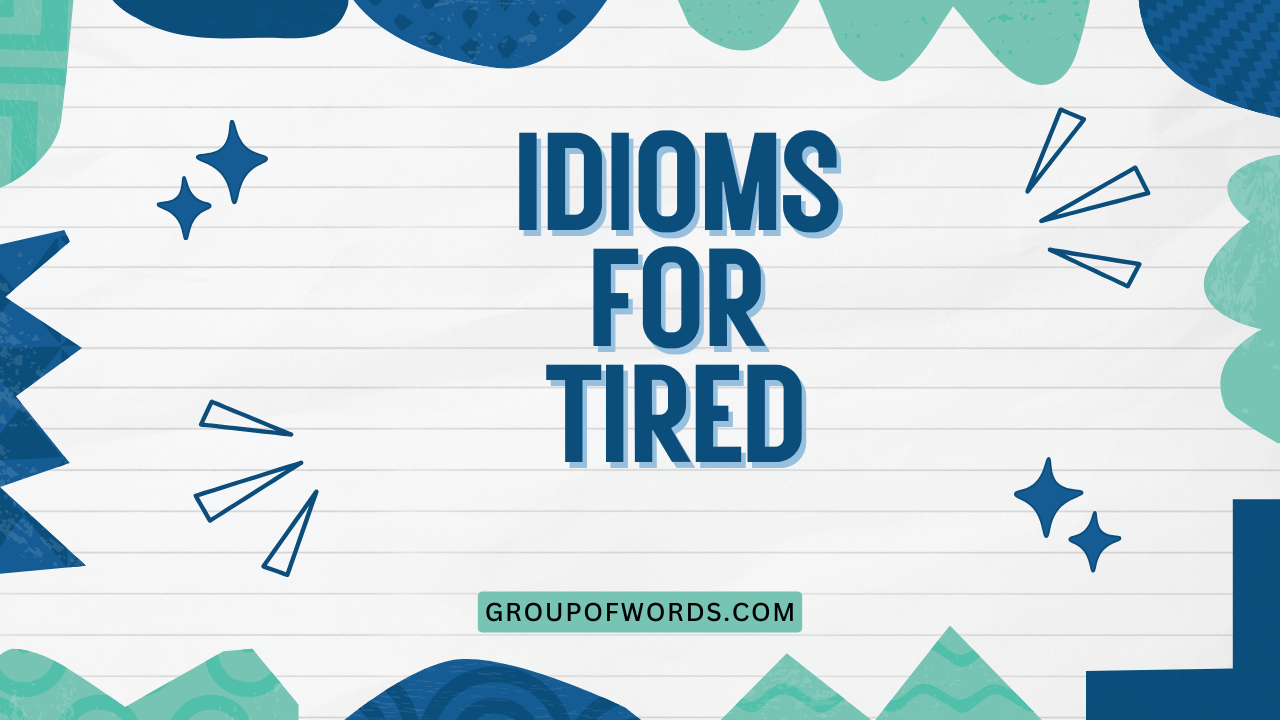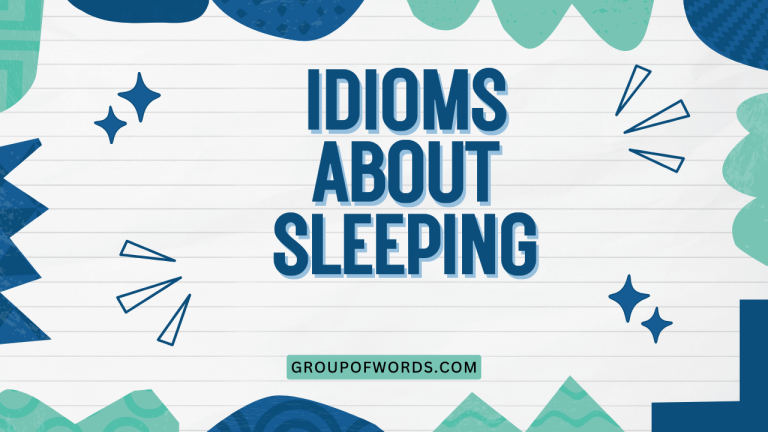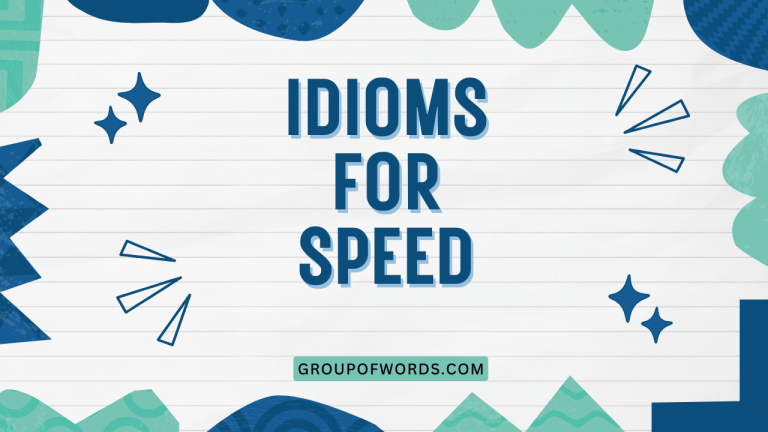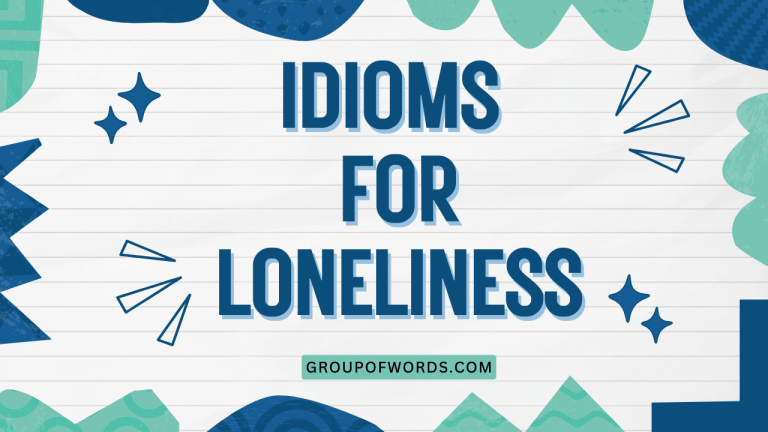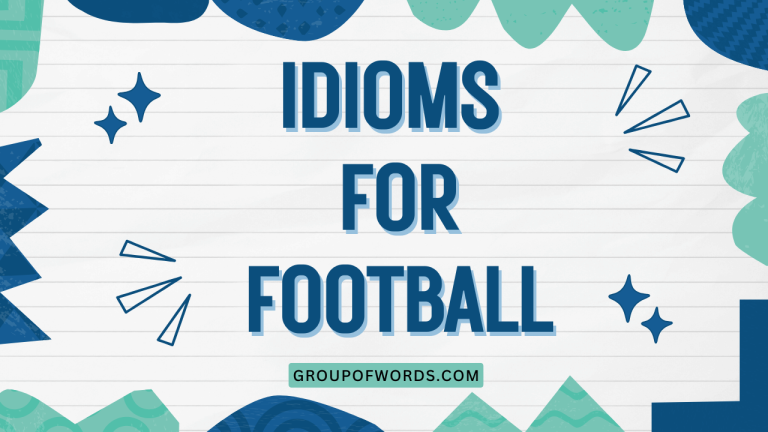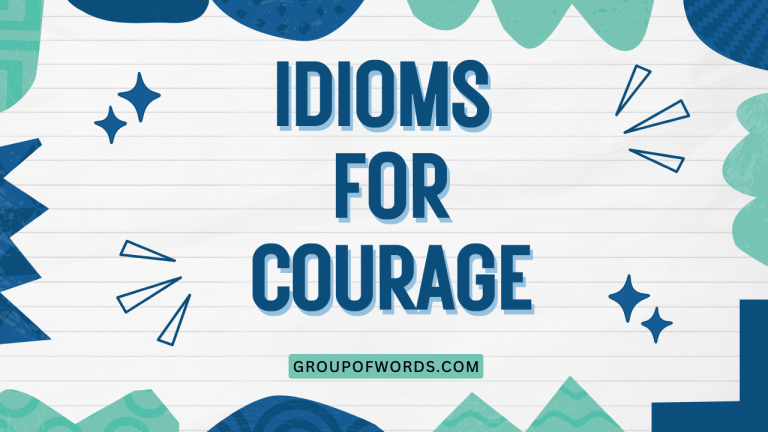Idioms for Tired: Mastering English Expressions
Understanding idioms is crucial for mastering English, especially for expressing nuanced emotions and states of being. Specifically, knowing various idioms for “tired” will significantly enhance your expressive abilities and comprehension of native English speakers.
This article delves into the world of idioms used to describe tiredness, providing definitions, examples, and practical exercises to help you incorporate these colorful expressions into your everyday language. Whether you’re an ESL student, a language enthusiast, or simply looking to expand your vocabulary, this guide will equip you with the knowledge and skills to confidently use idioms for fatigue.
Table of Contents
- Introduction
- Definition of Idioms for Tired
- Structural Breakdown
- Types and Categories of Idioms for Tired
- Examples of Idioms for Tired
- Usage Rules for Idioms for Tired
- Common Mistakes When Using Idioms for Tired
- Practice Exercises
- Advanced Topics: The Nuances of Idiomatic Language
- Frequently Asked Questions (FAQ)
- Conclusion
Introduction
Idioms are phrases or expressions whose meanings cannot be understood from the literal meanings of the individual words. They add color and depth to the English language, allowing speakers to convey complex emotions and ideas in a concise and impactful way.
When it comes to describing the feeling of being tired, English offers a rich variety of idioms that go beyond the simple word “tired.” Understanding these idioms is essential for both comprehending spoken and written English and for expressing yourself more fluently and naturally. These expressions often reflect cultural nuances and can significantly enhance communication.
This article is designed to provide you with a comprehensive understanding of idioms related to tiredness. We will explore their definitions, structural components, different categories, usage rules, and common mistakes to avoid.
Through numerous examples and practice exercises, you will learn how to effectively use these idioms in various contexts. Whether you’re preparing for an English proficiency exam or simply aiming to improve your conversational skills, this guide will serve as a valuable resource.
Definition of Idioms for Tired
An idiom is a phrase or expression whose meaning cannot be derived from the literal meaning of its individual words. Instead, the phrase has a figurative meaning that is understood culturally.
Idioms for “tired” are phrases that describe different levels and types of fatigue, ranging from mild weariness to extreme exhaustion. These idioms often use metaphorical language to paint a vivid picture of how someone is feeling.
For example, saying “I’m running on fumes” doesn’t literally mean that you’re powered by gasoline vapors; it means that you’re functioning with very little energy left.
These idioms are classified as figurative language and their function is to add color, emphasis, and cultural context to communication. The context in which an idiom is used is crucial for understanding its meaning. An idiom for “tired” might be appropriate in a casual conversation with friends but less suitable in a formal business presentation. Recognizing the appropriate context is key to using idioms effectively and avoiding misunderstandings.
Structural Breakdown
Idioms, by their very nature, defy standard grammatical rules. Their structure is fixed, meaning that you cannot typically change the words or their order without altering the idiom’s meaning or making it nonsensical.
Understanding the fixed nature of idioms is crucial for using them correctly. For example, you can’t say “I’m running on gas” instead of “I’m running on fumes” and expect to convey the same meaning.
Many idioms for “tired” follow common structural patterns, such as using prepositions (e.g., “worn out”), verbs with adverbs (e.g., “pooped out”), or comparisons (e.g., “dead on my feet”). Some idioms also incorporate metaphors or similes to create a more vivid image of fatigue.
For instance, “beat” is used metaphorically to represent the feeling of being physically or mentally exhausted. Analyzing the structural components of idioms can help learners recognize and remember them more easily.
Recognizing these patterns can aid in both comprehension and usage.
Types and Categories of Idioms for Tired
Idioms for “tired” can be categorized based on the intensity and type of fatigue they describe. Here are some common categories:
Idioms Describing Extreme Exhaustion
These idioms are used to express a state of being completely drained of energy, often after strenuous physical or mental activity. They convey a sense of being utterly depleted and unable to continue functioning effectively.
These are often used to describe the feeling after a very long day or a physically demanding task.
Idioms Describing Moderate Tiredness
These idioms indicate a feeling of being somewhat tired, but not completely exhausted. They suggest a level of fatigue that might require rest but doesn’t necessarily prevent one from continuing with their activities.
This level of tiredness is often experienced after a normal day of work or light exercise.
Idioms Describing Sleepiness
These idioms focus on the desire to sleep or the feeling of being drowsy. They often imply that the person is struggling to stay awake or is finding it difficult to concentrate due to sleepiness.
This category is distinct from general tiredness as it specifically relates to a need for sleep.
Idioms Describing Burnout
These idioms describe a state of emotional, physical, and mental exhaustion caused by prolonged or excessive stress. They often imply a sense of detachment, cynicism, and a lack of accomplishment.
Burnout is more than just being tired; it’s a deep-seated exhaustion that affects one’s overall well-being and performance.
Examples of Idioms for Tired
To illustrate the different categories of idioms for “tired,” here are some examples with explanations and contextual applications:
Examples of Idioms Describing Extreme Exhaustion
The following table provides examples of idioms used to describe extreme exhaustion. Each idiom is presented with its meaning and example sentence to illustrate its usage.
| Idiom | Meaning | Example Sentence |
|---|---|---|
| Beat | Extremely tired; exhausted. | After running the marathon, I was completely beat. |
| Dead on my feet | Extremely tired; barely able to stand. | Working a double shift left me dead on my feet. |
| Worn to a frazzle | Completely exhausted; worn out. | Taking care of three kids all day has left me worn to a frazzle. |
| Running on fumes | Operating with very little energy left. | I’ve been working non-stop all week; I’m running on fumes. |
| Knackered | (British English) Extremely tired. | I’m absolutely knackered after that hike. |
| Pooped out | Extremely tired; exhausted. | After the intense workout, I was completely pooped out. |
| Fried | Mentally or physically exhausted. | My brain is fried after studying for the exam all day. |
| Shattered | Extremely tired. | I worked a 12-hour shift and now I’m absolutely shattered. |
| Bushed | Very tired. | I’m really bushed after all that gardening. |
| Drained | Having had all energy or enthusiasm taken away. | The constant meetings left me feeling completely drained. |
| Ready to drop | Extremely tired and about to collapse. | After carrying all those boxes, I was ready to drop. |
| Dog-tired | Extremely tired. | I’m dog-tired after working in the yard all day. |
| On my last legs | Near the point of collapse from exhaustion. | I’ve been working so hard, I feel like I’m on my last legs. |
| Out on one’s feet | So tired that one can barely stand. | After the long flight, I was out on my feet. |
| Spent | Having no more energy. | I feel completely spent after finishing that project. |
| Whacked | (Informal) Very tired. | I’m totally whacked after that workout. |
| Zapped | Drained of energy. | The heat completely zapped my energy today. |
| Wiped out | Extremely tired. | I was wiped out after the long day of travel. |
| Flat out | Extremely busy and tired. | I’ve been flat out all week, I need a vacation. |
| Running on empty | Continuing to function despite being extremely tired. | I’m running on empty, but I have to finish this report. |
| Like death warmed up | Looking and feeling extremely unwell and tired. | After the flu, I felt like death warmed up. |
| Feeling like a truck hit me | Feeling extremely tired and sore. | After the rugby match, I felt like a truck hit me. |
| Fit to drop | Extremely tired. | I’m fit to drop after helping my friend move. |
| Dragging my feet | Moving slowly and with difficulty due to tiredness. | I was dragging my feet all day because I didn’t sleep well. |
| Completely done in | Extremely tired. | I’m completely done in after that hike. |
Examples of Idioms Describing Moderate Tiredness
This table presents idioms that describe a state of moderate tiredness. These expressions indicate a level of fatigue that is noticeable but not debilitating.
| Idiom | Meaning | Example Sentence |
|---|---|---|
| Tired out | Slightly tired; fatigued. | I’m a little tired out after the morning workout. |
| Worn | Showing the effects of use or fatigue. | I’m feeling a bit worn after a long day at work. |
| Dragging | Feeling tired and lacking energy. | I’m really dragging this afternoon; I need some coffee. |
| A bit weary | Slightly tired. | I’m feeling a bit weary after all that shopping. |
| Low on energy | Not having much energy. | I’m feeling a bit low on energy today, maybe I need more sleep. |
| Run-down | In poor health or feeling tired. | I’ve been feeling run-down lately; I think I’m getting a cold. |
| Feeling the strain | Feeling the effects of stress or hard work. | I’m feeling the strain of working long hours. |
| Not my usual self | Not feeling as energetic or healthy as usual. | I’m not my usual self today; I think I need a rest. |
| A little tired | Slightly fatigued. | I’m just a little tired after the meeting. |
| Feeling sluggish | Feeling slow and lacking energy. | I’m feeling sluggish this morning; I need to exercise. |
| Out of puff | Slightly breathless and tired. | I’m a little out of puff after climbing the stairs. |
| Not up to par | Not feeling as good or energetic as usual. | I’m not really up to par today; I think I need an early night. |
| Below par | Not feeling as well as usual. | I’m feeling a bit below par today; I might have a headache. |
| Need a rest | Feeling like one requires rest due to tiredness. | I definitely need a rest after all that work. |
| Feeling drained | Feeling that energy is depleted, but not completely exhausted. | I’m feeling a bit drained after the conference. |
| Lacking pep | Not having usual energy and enthusiasm. | I’m lacking pep today; I think I need a vacation. |
| A bit listless | Lacking energy and enthusiasm. | I’m feeling a bit listless today, probably because of the weather. |
| Feeling blah | Feeling unwell or lacking energy. | I’m feeling blah today; I might just stay in and relax. |
| Knocked for six | Feeling suddenly tired or unwell. | That news knocked me for six; I need to sit down. |
| Somewhat weary | Moderately tired. | I’m somewhat weary after the long drive. |
| Not firing on all cylinders | Not performing at one’s best due to tiredness or other factors. | I’m not firing on all cylinders today; I didn’t sleep well. |
| Running low | Having less energy than usual. | I’m running low on energy; I need to recharge. |
| In need of a break | Requiring a break due to fatigue. | I’m definitely in need of a break after this project. |
| Feeling the effects | Experiencing the consequences of exertion or lack of rest. | I’m feeling the effects of staying up late last night. |
| A bit Fagged | (British informal) Tired. | I’m bit fagged after all the walking. |
Examples of Idioms Describing Sleepiness
This table contains idioms specifically related to sleepiness, indicating a desire or need for sleep.
| Idiom | Meaning | Example Sentence |
|---|---|---|
| Sleepy | Feeling the need to sleep. | I’m feeling really sleepy after that big meal. |
| Drowsy | Feeling sleepy and lethargic. | The medication made me feel drowsy. |
| Ready for bed | Feeling that it is time to go to sleep. | After a long day, I’m ready for bed. |
| Dozy | Sleepy and lethargic. | I felt dozy during the afternoon lecture. |
| Nodding off | Starting to fall asleep unintentionally. | I started nodding off during the movie. |
| Out like a light | Falling asleep very quickly and deeply. | As soon as my head hit the pillow, I was out like a light. |
| Can barely keep my eyes open | Feeling extremely sleepy and struggling to stay awake. | I can barely keep my eyes open after staying up all night. |
| Fighting sleep | Trying to stay awake despite feeling sleepy. | I was fighting sleep during the late-night meeting. |
| In need of some shut-eye | Needing some sleep. | I’m definitely in need of some shut-eye after this. |
| Longing for a nap | Desiring a short period of sleep. | I’m longing for a nap this afternoon. |
| Heavy-eyed | Feeling sleepy and having difficulty keeping eyes open. | I’m heavy-eyed after the long flight. |
| Off to dreamland | Going to sleep. | I’m off to dreamland; goodnight! |
| Time to hit the hay | Time to go to bed. | It’s time to hit the hay; I’m exhausted. |
| Time to catch some Z’s | Time to sleep. | I need to catch some Z’s; I’m so tired. |
| Sleep-deprived | Lacking sufficient sleep. | I’m sleep-deprived after working so many late nights. |
| Feeling the sandman | Feeling sleepy, as if the sandman is putting sand in your eyes. | I’m feeling the sandman; I need to go to bed. |
| Groggy | Dazed, weak, or feeling sleepy, especially after waking up. | I feel groggy after waking up from a nap. |
| In the land of Nod | Asleep. | He’s already in the land of Nod; don’t wake him. |
| Want to crash | Want to go to sleep quickly and deeply. | I just want to crash after this long day. |
| Sleepwalking | To be nearly asleep while awake. | I’m sleepwalking through this meeting. |
| Barely awake | Almost asleep. | I’m barely awake this morning; I need coffee. |
| Eyes drooping | Having eyelids that are starting to close due to sleepiness. | My eyes are drooping; I need to sleep. |
| Feeling somnolent | Feeling sleepy or drowsy. | I’m feeling somnolent after the heavy meal. |
| Yielding to slumber | Giving in to sleep. | I’m yielding to slumber; goodnight. |
Examples of Idioms Describing Burnout
This table lists idioms that specifically describe burnout, a state of emotional, physical, and mental exhaustion caused by prolonged stress.
| Idiom | Meaning | Example Sentence |
|---|---|---|
| Burned out | Experiencing emotional, physical, and mental exhaustion caused by prolonged stress. | After years of working in a high-pressure environment, she felt completely burned out. |
| At the end of my rope | Having no more patience or energy to deal with a difficult situation. | Dealing with constant complaints has left me at the end of my rope. |
| Reached my limit | Having reached the point where one can no longer tolerate or cope with something. | I’ve reached my limit with this demanding job. |
| Worn down | Having one’s resistance or enthusiasm reduced by prolonged pressure or difficulty. | The constant criticism had worn him down over time. |
| Fed up | Annoyed or bored, and wanting something to change. | I’m completely fed up with the endless bureaucracy. |
| Had enough | Having reached the point where one can no longer tolerate something. | I’ve had enough of this constant stress. |
| Running on empty emotionally | Continuing to function despite being emotionally depleted. | She’s running on empty emotionally after caring for her sick mother. |
| Lost my spark | Having lost one’s enthusiasm or motivation. | He’s lost his spark after years of working in the same job. |
| Drained of enthusiasm | Having lost all enthusiasm. | I’m drained of enthusiasm for this project. |
| Past the breaking point | Having reached the point where one can no longer cope. | She’s past the breaking point with all the pressure at work. |
| Feeling cynical | Having a negative or pessimistic outlook. | I’m starting to feel cynical about my career. |
| Disillusioned | Disappointed in something after discovering it to be less good than one had believed. | I’m disillusioned with the promises of this job. |
| Feeling apathetic | Showing or feeling no interest, enthusiasm, or concern. | I’m feeling apathetic about everything lately. |
| Completely jaded | Tired, bored, or lacking enthusiasm, typically after having had too much of something. | I’ve become completely jaded from working in this industry for so long. |
| Out of steam | Having no more energy or enthusiasm to continue doing something. | I’ve run out of steam with this project. |
| Emotionally exhausted | Feeling extremely tired emotionally. | I’m emotionally exhausted after dealing with so many conflicts. |
| Mentally fatigued | Feeling mentally tired. | I’m mentally fatigued from studying all day. |
| No motivation | Lacking the desire or willingness to do something. | I have no motivation to work on this task. |
| Lacking drive | Not having the energy or enthusiasm to pursue goals. | I’m lacking drive to pursue my goals. |
| At a standstill | Having no activity or movement. | My career feels at a standstill, and it’s burning me out. |
| Losing the passion | No longer feeling enthusiastic about something. | I’m losing the passion for my work. |
| Feeling detached | Feeling disconnected or distant from others or from one’s environment. | I’m feeling detached from my work. |
| Lacking purpose | Not feeling that one’s life has meaning or direction. | I feel like I’m lacking purpose, which is burning me out. |
| Feeling unfulfilled | Not feeling satisfied with one’s life or work. | I’m feeling unfulfilled in my current role. |
| Stuck in a rut | Living or working in a situation that has become boring and unpleasant. | I feel stuck in a rut at work. |
Usage Rules for Idioms for Tired
Using idioms correctly requires understanding not only their meanings but also the contexts in which they are appropriate. Here are some key usage rules to keep in mind:
- Context Matters: Consider the formality of the situation. Idioms are generally more suitable for informal conversations than formal presentations or written reports.
- Audience Awareness: Be mindful of your audience. Some idioms may be unfamiliar to non-native speakers or people from different cultural backgrounds.
- Fixed Structure: Remember that idioms have a fixed structure. Avoid changing the words or their order, as this can alter the meaning or make the idiom nonsensical.
- Figurative Meaning: Understand the figurative meaning of the idiom. Don’t interpret the words literally, as this will lead to miscommunication.
- Cultural Sensitivity: Be aware that some idioms may have different connotations or be considered offensive in certain cultures.
- Natural Usage: Use idioms naturally and sparingly. Overusing idioms can make your speech sound forced or unnatural.
For example, using the idiom “knackered” (British English for extremely tired) might be perfectly acceptable in a conversation with British friends but could be confusing for someone unfamiliar with British slang. Similarly, using an idiom like “dead on my feet” in a formal business meeting would be inappropriate due to its informal tone.
Therefore, it’s important to consider the context and audience before using any idiom.
Common Mistakes When Using Idioms for Tired
Learners often make mistakes when using idioms, especially when they are new to the language. Here are some common errors to avoid:
- Literal Interpretation: Interpreting the words of an idiom literally instead of understanding its figurative meaning.
- Incorrect: “I’m running on fumes” (literally imagining someone powered by fumes).
- Correct: “I’m running on fumes” (meaning I’m operating with very little energy left).
- Incorrect Word Order: Changing the order of the words in an idiom.
- Incorrect: “I’m my feet on dead.”
- Correct: “I’m dead on my feet.”
- Using the Wrong Words: Substituting words in an idiom with similar words.
- Incorrect: “I’m beat up.”
- Correct: “I’m beat.”
- Inappropriate Context: Using an idiom in a context that is too formal or informal.
- Incorrect: “I’m pooped out” (in a formal business presentation).
- Correct: “I’m tired” or “I’m exhausted” (in a formal business presentation).
- Overusing Idioms: Using too many idioms in a short period, making your speech sound unnatural.
- Incorrect: “I’m dead on my feet, running on fumes, and completely wiped out!” (too many idioms at once).
- Correct: “I’m extremely tired after that long day.”
By being aware of these common mistakes, you can avoid errors and use idioms for “tired” more effectively.
Practice Exercises
Test your understanding of idioms for “tired” with these practice exercises:
Exercise 1: Fill in the Blanks
Complete the following sentences with the appropriate idiom for “tired” from the list below. (Note: Some idioms may be used more than once.)
Idioms: beat, running on fumes, worn out, sleepy, burned out, dog-tired, ready for bed, knackered
| Question | Answer |
|---|---|
| 1. After working a double shift, I was completely __________. | dog-tired |
| 2. I’m so __________; I think I’ll go to sleep early. | sleepy |
| 3. After years of high-pressure work, she felt __________. | burned out |
| 4. I’ve been working non-stop all week; I’m __________. | running on fumes |
| 5. I’m absolutely __________ after that intense workout. | beat |
| 6. After taking care of the kids all day, I’m __________. | worn out |
| 7. (British English) I’m ________ after that long walk in London. | knackered |
| 8. I’m __________; I think I’m going to read a book in bed. | ready for bed |
| 9. I’ve been _______ all week, and need to rest. | running on fumes |
| 10. After playing all day, the kids were completely ________. | beat |
Exercise 2: Matching
Match the idiom with its correct meaning:
| Idiom | Meaning |
|---|---|
| 1. Dead on my feet | A. Feeling the need to sleep |
| 2. Out like a light | B. Extremely tired; barely able to stand |
| 3. Heavy-eyed | C. Experiencing emotional, physical, and mental exhaustion |
| 4. Burned out | D. Falling asleep very quickly and deeply |
Answers:
- 1 – B
- 2 – D
- 3 – A
- 4 – C
Exercise 3: Sentence Completion
Choose the best idiom to complete each sentence:
- After the marathon, he was so tired he was __________.
- a little tired
- dead on his feet
- feeling sluggish
- She had been working so hard, she felt like she was __________.
- ready for bed
- running on fumes
- a bit weary
- He was __________ after staying up all night studying.
- feeling the strain
- out like a light
- can barely keep his eyes open
- After years of overwork, the doctor was __________.
- burned out
- tired out
- dragging
- I’m __________; I think I’ll take a nap.
- feeling the sandman
- feeling the strain
- worn
Answers:
- b
- b
- c
- a
- a
Advanced Topics: The Nuances of Idiomatic Language
For advanced learners, understanding the nuances of idiomatic language is essential for mastering English. This includes recognizing subtle differences in meaning between similar idioms, understanding the historical and cultural contexts that shaped these expressions, and appreciating the creative and metaphorical nature of idiomatic language.
For example, while “beat” and “worn out” both describe exhaustion, “beat” often implies a more sudden and intense fatigue, while “worn out” suggests a gradual depletion of energy over time. Exploring the etymology of idioms can provide deeper insights into their meanings and usage.
Additionally, understanding regional variations in idiomatic language is crucial for effective communication. Idioms can vary significantly between different English-speaking countries and even between different regions within the same country.
Being aware of these variations can help you avoid misunderstandings and communicate more effectively with people from diverse backgrounds. Continued exposure to authentic English materials, such as literature, movies, and conversations with native speakers, is essential for developing a sophisticated understanding of idiomatic language.
Frequently Asked Questions (FAQ)
- What is an idiom?
An idiom is a phrase or expression whose meaning cannot be understood from the literal
meanings of the individual words. It has a figurative meaning that is culturally understood.
- Why is it important to learn idioms?
Learning idioms enhances your understanding of spoken and written English, allows you to express yourself more fluently and naturally, and helps you communicate more effectively with native English speakers.
- How can I improve my understanding of idioms?
You can improve your understanding of idioms by studying their definitions, practicing their usage in context, and exposing yourself to authentic English materials such as literature, movies, and conversations with native speakers.
- Are idioms the same in all English-speaking countries?
No, idioms can vary significantly between different English-speaking countries and even between different regions within the same country. It’s important to be aware of these variations to avoid misunderstandings.
- Can I create my own idioms?
While it’s possible to create new expressions, idioms are generally established phrases that are widely recognized and understood within a particular culture or language community. Creating your own idioms may lead to confusion unless they are adopted by others.
- How do I avoid misusing idioms?
To avoid misusing idioms, be sure to understand their meanings, use them in appropriate contexts, and be mindful of your audience. Practice using idioms in various situations and seek feedback from native English speakers.
- Are idioms only used in spoken English?
No, idioms are used in both spoken and written English, although they tend to be more common in informal contexts such as conversations, personal emails, and creative writing. Formal writing often requires more precise and literal language.
- What is the difference between an idiom and a proverb?
An idiom is a phrase with a figurative meaning, while a proverb is a short, well-known saying that expresses a general truth or piece of advice. Proverbs often convey wisdom or moral lessons, while idioms are primarily used to add color and emphasis to communication.
- How can I remember new idioms?
You can remember new idioms by associating them with vivid images, creating example sentences, and using them in conversations. Reviewing idioms regularly and incorporating them into your daily language practice can also help you retain them.
- Is it okay to use idioms in a job interview?
It depends on the context and the specific idiom. Generally, it’s best to use idioms sparingly in job interviews and to choose idioms that are widely understood and appropriate for a professional setting. Avoid using slang or overly informal expressions.
Conclusion
Mastering idioms for “tired” is a valuable step towards achieving fluency in English. By understanding the definitions, structural components, categories, usage rules, and common mistakes associated with these expressions, you can enhance your communication skills and express yourself more effectively.
Remember to practice using idioms in various contexts and to continue expanding your vocabulary through exposure to authentic English materials. With dedication and persistence, you can confidently incorporate these colorful expressions into your everyday language and communicate with greater precision and flair.
Keep practicing, and soon you’ll be able to say exactly how tired (or not!) you are with perfect accuracy and style. Happy learning!
